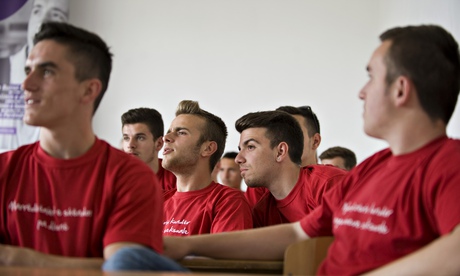Teaching young men to break the cycle of sexual violence

'When I saw a girl in the street, I would tease her and pass nasty comments," says 17-year-old Jetmir Fejzullahu. "What I learned was that it doesn't make you attractive and interesting, but the opposite." Sitting in a bare school hall with graffiti scrawled across the walls, Jetmir is one of several teenagers discussing what they have learned from a special project about gender inequality and sexual violence in Kosovo.
Care International launched the Young Men Initiative (YMI) in 2007 with local partners in Kosovo, where an estimated 20,000 women were raped during the war. It is one of 22 countries worldwide where the UK-based charity focuses on sexual violence.
A study by the Kosovo Women's Network in 2008, almost a decade after the war, found that 43% of the population had experienced domestic violence, and that violence against women and children is largely under-reported. "For most people," John Crownover, programme adviser for the initiative, says, "violence is not seen as a violation of women's rights but as normal interaction between men and women."
Crownover explains why they set up in Kosovo: "Young people growing up in the aftermath of the conflict were faced with the rise of xenophobia, nationalism and gender inequalities. For boys, particularly in working-class neighbourhoods, many of the so-called successful men they saw were either 'hyper masculine' or linked to criminal activities. We're trying to shift attitudes that can lead to sexual and other types of interpersonal violence."
During the workshop at a vocational school in Pristina this month, Jetmir and his classmates appear at ease discussing gender stereotyping and the pressures of masculinity. They participate in a lively discussion about societal expectations, calling out examples of common gender markers ("Beard!" "Muscles!" "Bodybuilding!"), as workshop leader Armend Morina scribbles them on paper taped to the wall. It's a school that draws children from lower socioeconomic groups compared with the more academic local schools but, in contrast to other classroom discussions I've witnessed, even the word "testicles" passes without sniggering.
The boys' comfort seems to stem in part from their close relationship with the male leaders of the project: as Morina and YMI coordinator Besnik Leka enter the classroom, the boys clap them on the back like old friends. It's clear that a strong rapport has developed over the year-long programme, made up of 10 one-hour sessions and a residential course. After the workshop, the boys rush outside, displaying their Declaration Against Verbal, Physical and Sexual Violence, and encourage passing students to sign it.
Alongside the initiative, the participants run the Be a Man club, which sees them carry out public campaigns and even appear on local television. Their Facebook page has close to 20,000 likes and aYouTube video they made with famous local rapper Lyrical Son has attracted almost 1.5m hits.
Across the Balkans, 15,000 boys have taken part in the programme. Later, we visit the headquarters of the local organisation Peer Educators Network (Pen), Care's local partner in Pristina. Bright murals and photographs of program participants cover the walls, adorned with slogans like "Be a man, change the rules!" Here we meet 18-year-old Aid Kelmendi, who starred in the rap video, and his twin brother Ferida. Their mother tells us how "happy and proud" she is about their involvement in the program: "Because Kosovo is a young country, there are fears for alcohol and drug abuse leading to violence. Kids are often out and even for those parents who try to do their best, it's difficult. So I'm happy there are places like this program where they can learn about these things."
The results are striking. Before the initiative, 69% of participants thought physical strength was the most important quality for a man – this dropped to 42%. The number who said they wouldn't automatically join friends in a fight rose from 38% to 57%. And the proportion who thought a man was justified in beating a woman for cheating on him dropped from 52% to 27%.
Clearly, there is a long way to go, but the results are so encouraging that governments in Croatia, Serbia and Kosovo have accredited theprogramme for secondary schools, and are training teachers to deliver it. Care is calling on governments worldwide to follow suit, arguing that education on gender inequality, stereotypes and violence is vital.
As representatives from more than 140 countries prepare to gather in London this week for the global summit on ending sexual violence in conflict, hosted by William Hague and Angelina Jolie, Care has launched a petition to #ChallengeAttitudes – calling for a focus on education at the summit.
Alice Allan, global head of advocacy at Care International and adviser to Hague on the preventing sexual violence initiative, says: "We will not end warzone rape unless we tackle its root causes. Sickening attacks on women and girls are a daily occurrence around the world. Ministers must use this moment to galvanise action to shift global attitudes to women."
According to the World Health Organisation, attitudes that accept violence and gender inequality increase the likelihood of both intimate partner and sexual violence. This underlines the importance of education in tackling these problems, not just for conflict-affected areas but also more widely.
The YMI could be valuable here in the UK, where a 2010 YouGov pollfound almost one in three 16-18-year-old girls has experienced unwanted sexual touching at school, yet education on healthy relationships and sexual violence is not a compulsory part of the curriculum.
Allan points out: "Gender inequality is not a women's issue – it concerns every member of society. Men and boys must be allies and champions for change and this can stop the cycle of violence from spreading to the next generation."


